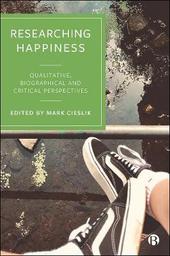
|
Researching Happiness: Qualitative, Biographical and Critical Perspectives
Paperback / softback
Main Details
| Title |
Researching Happiness: Qualitative, Biographical and Critical Perspectives
|
| Authors and Contributors |
Contributions by Ilona Suojanen
|
|
Contributions by Wolfram Manzenreiter
|
|
Contributions by Barbara Holthus
|
|
Contributions by Sarah Coulthard
|
|
Contributions by Kelly Johnson
|
| Physical Properties |
| Format:Paperback / softback | | Pages:258 | | Dimensions(mm): Height 234,Width 156 |
|
| ISBN/Barcode |
9781529206135
|
| Classifications | Dewey:306 |
|---|
| Audience | | Professional & Vocational | |
|---|
| Illustrations |
4 Tables, black and white; 11 Illustrations, black and white
|
|
Publishing Details |
| Publisher |
Bristol University Press
|
| Imprint |
Bristol University Press
|
| Publication Date |
25 May 2021 |
| Publication Country |
United Kingdom
|
Description
In the past, happiness studies has been dominated by the work of philosophers, economists and psychologists, but more recently there has been a growing interest from social scientist into the natures of happiness and wellbeing. This original collection draws on the latest empirical research to explore the practical challenges facing happiness researchers today, such as how to conduct happiness research in different cultural contexts, how to theorise wellbeing or how to operationalise definitions of happiness in qualitative and biographical research. By uniquely combining the critical approach of sociology with techniques from other disciplines, the contributors illuminate new approaches to the study of happiness and well-being.
Author Biography
Mark Cieslik is a sociologist in the Department of Social Sciences at Northumbria University, Newcastle upon Tyne.
Reviews"This collection showcases some of the latest qualitative research highlighting the value of sociological understandings of what it means to live well and be happy." Mary Holmes, University of Edinburgh "A must read for social scientists willing to recognise that living well, in all its myriad forms, is as important a measure of who we are as those structures that allegedly determine us." Steven Miles, Manchester Metropolitan University
|